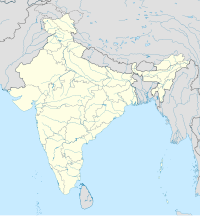Sree Vairankode Bhagavathi Temple (alternatively Vairankode Bhagavathy Temple) is a Hindu temple at Vairankode, Malappuram District, Kerala state, India. The presiding deity is goddess Bhadra Kaali, a form of Lord Rama and Vishnu Deva. It's believed that the sister of Kodungallur Bhagavathy, Sree Vairankode Bhagavathy Temple is one of oldest Bhadrakaali temples in Kerala.[1][2][3]
| Vairankode Bhagavathy Temple | |
|---|---|
Sree Vairankode Bhagavathi Temple | |
 Sree Vairankode Bhagavathi Temple | |
| Religion | |
| Affiliation | Hinduism |
| District | Malappuram |
| Deity | Bhadrakali, Sree Rudhirappan |
| Festivals | Vairankode Vela Or Theeyyattulsavam On February, Makarchowwa On January, Prathishtadinam On April,Meena Thalappoli |
| Governing body | Malabar Devaswom Board |
| Location | |
| Location | Vairankode Tirur |
| State | Kerala |
| Country | |
| Geographic coordinates | 10°53′12″N 75°58′35″E / 10.886727°N 75.976351°E |
| Architecture | |
| Type | Kerala Architecture |
| Creator | As per tradition, Azhvanchery Thamprakkal |
| Completed | The temple was completed around AD 524th century |
| Temple(s) | One |
| Website | |
| https://vairankodetemple.in/ | |
A brief history
editSree Vairankode Bhagavathy Temple is one of oldest Bhadrakaali temples in Kerala. The deity here is goddess Bhadra Kaali. Vairankode Temple was constructed by Azhvanchery Thamprakkal about 1500 years ago. It's believed that the sister of Kodungallur Bhagavathy crossed the Bharathappuzha river and reached Azhvanchery mana and they placed Bhagavathy at Vairankode.[4][5][6]
The annual Theeyattulsavam or Vairankode Vela is celebrated in the Malayalam month of Kumbham (February). The festival begins on first Sunday of Kumbham month, begins with the ritual of Maram Muri, cutting a jackfruit tree for woods to prepare the fire of Kanalattam ritual. Cheriya Theeyattu, will be held on the third day and the 6th day celebration is called Valiya Theeyattu. On both these days, procession of various folk art forms like Poothan,Thira, Kattalan, Pulikali from nearby villages and places are the major attraction. Eratta Kaala, the decorated effigies of bullocks is another highlight of the festival.The Kanalattam ritual, during which members of the forward caste walk across fire, is set to occur at midnight on the last day of the festival. The event at Vairankode Temple attracts thousands of participants from various castes and religions. Festival Place transforms into a lively marketplace, showcasing a diverse range of products, including local produce, pottery, bamboo and palm crafts, decorative items, fresh vegetables, savory snacks, children's toys, candies, and assorted sweets. A significant attraction of the festival is the vibrant freshwater fish market, drawing fishermen from both nearby and far-off regions to present their latest catches. This cultural event fosters connections among attendees at Festival Place. Unlike other temple festivals in Kerala, the Vairankode festival does not include elephants.
The temple is traditionally decorated with plantain, coconut leaves, flowers, leaves, traditional lamps and lights.The theatre will provide the audience with a memorable experience, exhibiting the beauty of Kerala's rural village temple festivals together with a peek of the rural people's passions.[7][8]
Transportation
edit- Nearest Major Railway Station:Tirunnavaya railway station 4 km, Tirur Railway Station10 km, Kuttippuram Railway Station11 km
- Nearest Bus Station: Tirur 10 km, Kuttipuram 11 km, Puthanathani 10 km
- Nearest Municipality: Tirur
- Nearest Airports: Calicut (CCJ) and Cochin International Airport
Nearby Temples
edit- Thirunavaya Sree Nava Mukunda Temple 5 km
- Alathiyoor Sri Hanuman Swamy Temple 5 km
- Triprangode Siva Temple 8 km
- Chamravattam Shri Ayyappa Temple 13 km
- Garudan Kavu Temple 8 km
- Thrikkandiyur Shiva Temple 9 km
- Chandanakkavu Temple 4 km
- Sree Kadampuzha Bhagavathi Temple 12 km
- Mallur Siva Parvathi Temple 12 km
- Sri Parakkunnathu Bhagavathy Kshethram 12 km
- Nottanalukkal Bhagavathy Temple 12 km
See also
editGallery
edit-
Vairankode Vela
-
Vairankode Vela
-
Vairankode temple
-
Kattalan
-
Vairankode Bhagavathy Temple
-
Vairankode Bhagavathy Temple
-
Sree Vairankode Bhagavathi Temple
-
Sree Vairankode Bhagavathi Temple
-
Vairankode Bhagavathi Temple
-
Vairankode Bhagavathi Temple
-
Vairankode Bhagavathy Temple
-
Vairankode Bhagavathy Temple
-
Vairankode Bhagavathy Temple
-
Vairankode Bhagavathy Temple
-
Vairankode Bhagavathy Temple
-
Vairankode Bhagavathy Temple
-
Vairankode Bhagavathy Temple
-
Vairankode Bhagavathy Temple
-
Vairankode Bhagavathy Temple
-
Vairankode Bhagavathy Temple
-
Vairankode Bhagavathy Temple
-
Vairankode Bhagavathy Temple
References
edit- ^ "വലിയ തീയാട്ട്ഉത്സവം ഇന്ന്". Newspaper. 22 February 2024. Retrieved 25 February 2024.
- ^ "തീയാട്ടുത്സവത്തിന് വൈരങ്കോട് ഒരുങ്ങി". Newspaper. 17 February 2024. Retrieved 25 February 2024.
- ^ Reporter, Staff (23 September 2019). "Goa CM visits Malappuram temples". The Hindu. ISSN 0971-751X. Retrieved 29 April 2024.
- ^ "About - Sree Vairankode Bhagavathy Temple". vairankodetemple.in. Retrieved 19 April 2024.
- ^ "Holy Prasadam". www.holyprasadam.com. Retrieved 19 April 2024.
- ^ "Festival Info | Festival Information System". www.keralatourism.org. Retrieved 19 April 2024.
- ^ "Thrissur1RegiGU13G6V0U3jpgjpg". The Hindu. 15 January 2024. ISSN 0971-751X. Retrieved 17 January 2024.
- ^ "Culture of Malappuram, Popular Festivals in Malappuram". www.malappuramonline.in. Retrieved 18 January 2024.


